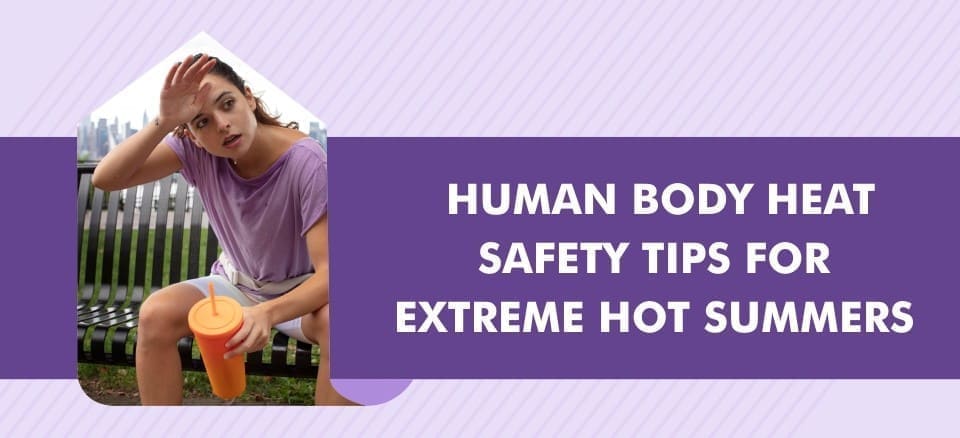


[vc_row][vc_column][vc_column_text]Keeping your body heat-safe during the hot summer months may seem like a given. You wouldn’t think it would be that hard, right? Just keep cool and you should be okay. But when there’s a heatwave, keeping cool is not always easy. So what do you do if you want to stay hydrated on a really hot day? Let’s look at some ways to keep cool in the summer’s hottest weather and control human body heat.
If you or a family member suffers from heatstroke, seek medical attention immediately.
Heatstroke is a medical emergency and the first thing you should do if you or a family member gets it is call your local emergency number. Then, if possible, get the person to a shady area, remove clothing and cool them rapidly by immersion in cool water or using fans or air-conditioning.
Heat exhaustion and heat stroke are both serious but preventable conditions. The first signs of these conditions include:
Heat exhaustion treatment includes getting away from the heat source (if possible), removing any excess clothing and drinking plenty of water until symptoms go away on their own within an hour or two—unless you’re vomiting repeatedly or have diarrhea; if either condition occurs along with your other symptoms—which indicate that it’s time for professional medical care—then seek out medical attention immediately!
Eating smaller meals and eating more fruits and vegetables would mean more energy for the human body. It would increase your energy levels and reduce the chances of you getting a heat stroke and provide many other key benefits to your health. The amount of protein taken daily should be at least 10 %, while fats should be no more than 30%. When taking in sugar or carbohydrates, try to consume them with fibre sources such as fruits or vegetables.
Protect your eyes and your eyesight by wearing some good sunglasses that provide UV protection. It is essential to spend a lot of time out in the sun. The sun’s rays can damage your eyes, causing them to age prematurely and possibly result in cataracts, macular degeneration or glaucoma.
If you’re looking for a way to beat the heat, consider a pair of prescription sunglasses. These glasses will help protect your eyes from harmful UV rays and make it much easier to see anything in front of you. Additionally, there are cooling gel eye masks available on the market which can be used after an intense day in the sun. These masks work by cooling down the blood vessels under your eyelids while also providing some incredible relief from the other symptoms associated with sunburn.
It’s especially important to pay attention to young children at higher risk of heat-related illness. Never leave infants or children alone in a car, not even for a few minutes. Even if you think the vehicle is cool enough outside, the temperature inside can rise much faster than you think–and the consequences can be deadly.
If you see a child locked inside a hot car, call for help immediately and keep trying until help arrives. If there is time and it seems safe, let the child know that someone will return soon to safely get them out of there. Pets should never be left behind in parked vehicles during summer months, as heat exposure can be lethal for them–so make sure they’re never left behind when heading out on any errands!
Consider scheduling outdoor activities carefully, including moving exercise indoors during the hottest part of the day.
Be prepared to take breaks in the shade and move indoors as needed.
The idea of staying cool during the summer is not so much about getting a cold beverage and taking a dip in your pool but rather keeping yourself safe and healthy.
Here are some extreme heat safety tips :
The primary reason for the prevalence of diseases in summer is the presence of suitable weather conditions for bacteria, viruses, and other parasites to breed. So stay safe this summer by listening to your human body signals, taking breaks from time outside when needed, drinking lots of water before heading out into the heat again – and above all else, having fun!
To protect your health during summer, please take preventive measures. Please consult our doctors at Amandeep Multispeciality Hospital for any ailments you may be suffering from this summer.[/vc_column_text][/vc_column][/vc_row]
September 30, 2024
Recognize the Signs: Understanding Appendicitis Pain Symptoms
September 24, 2024
Unveiling the Truth: I-Pill Side Effects Every Woman Should Know
We use cookies to enhance your experience. By clicking "Accept", you agree to our use of cookies.